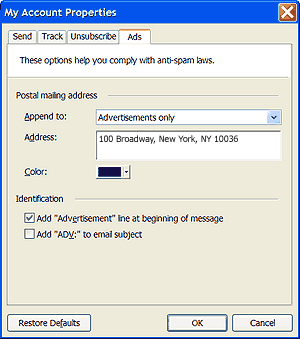New US anti-spam law
Disclaimer: This page is for informational
purposes only. No warranty is expressed or implied. We encourage you
to speak with your own legal advisor.
Overview
The new U.S. anti-spam law, the
CAN-SPAM Act of 2003

, took effect
on January 1, 2004.
What it requires
The law requires the following for all unsolicited commercial email,
regardless of number of emails sent:
- Include a way to unsubscribe over the Internet
- Honor unsubscribes within 10 days
- Unsubscribe mechanism must work for at least 30 days after
message is sent
- Include the sender's valid postal mailing address
- Clearly identify the email as an advertisement in some fashion
- Use an accurate sender name and a valid email address
- Accurately describe the content of the email in the subject
line
How Email Marketer helps you comply
Email Marketer helps you avoid legal penalties by:
Handling unsubscribes
Email Marketer automatically handles
unsubscribes. Recipients may:
- Click the unsubscribe link automatically appended by Email Marketer
- Send an email unsubscribe request
Email Marketer handles both kinds of unsubscribes automatically and
makes sure these recipients are not sent email again.
Managing subscriptions
Email Marketer' subscription manager
lets recipients view and update all their subscriptions in a single
screen.
Adding postal mailing address

Email Marketer lets you automatically append your postal mailing address
to outgoing messages, to comply with the new law.
Identifying advertisements
Email Marketer lets you automatically add the following to commercial
email, to comply with the new law:
- An "Advertisement" line at the beginning of the message
- The phrase "ADV:" in the email subject
What the law covers
The law applies to unsolicited advertisements and promotional emails.
It also covers many email newsletters:
The term commercial electronic mail message means any
electronic mail message the primary purpose of which is the
commercial advertisement or promotion of a commercial product
or service (including content on an Internet website operated
for a commercial purpose).
This law pre-empts existing state anti-spam laws. It applies if your
business or organization is located within the United States, or if
any recipient is within the U.S.
What it doesn't cover
- Requested email: If recipients have specifically agreed
to receive such messages, the requirements below do not apply
- Relationship and transactional business email: e.g. email
about orders, accounts, ongoing services, and product updates for
which the recipient has already paid, is required only to use an
accurate sender name and email address, and not falsify the sender
IP address
- Non-commercial email: e.g. email about non-profit and
political events
Additional requirements
Current
- Don't falsify the sender IP address
- Don't send email through an outgoing mail (SMTP) server you're
not authorized to use
- Don't collect or harvest email addresses from Web pages or Usenet
newsgroups
- Don't create email addresses using a random generator or dictionary
- Include a warning in the email subject if the message contains
adult content
Future
Although the law took effect on 1/1/04, the U.S. Federal Trade Commission
(FTC) will clarify some of its provisions in the near future:
- Will recommend more specifically how to classify a message as
an advertisement, within 12 months
- Will recommend more specifically how advertisements must identify
themselves, within 18 months
- Will recommend rewards for reporting violators, within 9 months
- May recommend a national do-not-email registry, within 6 months
- Will decide on a way to identify adult content in the subject
line, within 120 days
- Will decide on how to prevent cellular phone spam, within 270
days








 , took effect
on January 1, 2004.
, took effect
on January 1, 2004.
